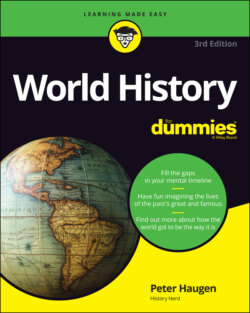Читать книгу World History For Dummies - Peter Haugen - Страница 44
Perceiving and avoiding biases
ОглавлениеSome people challenge the very concept of history. “Whose history are we talking about?” they ask. If the victors write history, why do we accept those bullies’ tainted point of view as being true? What about the victims? What about the indigenous peoples, such as American Indians and Australian Aborigines? What about women? It’s not fair that so much of history is so overwhelmingly about white men.
It’s true that history as we know it is slanted. History is people writing about people, so prejudice is built in. You have to factor in the biases of the time in which events happened, the biases of the time when they were written down, and the prejudices of the scholars who turn them over and over again decades and often centuries later. I can’t change the fact that so many conquerors, monarchs, politicians, soldiers, explorers, and — yes — historians have been men. It’s just as true that conventionally taught world history still spends a disproportionate amount of time on Europe, on how it was shaped and how it shaped the other parts of the world: the Americas, Africa, the Middle East, and Asia.
Are there other stories worth telling, other points of view, and other truths? You bet. You’ll find some of them in this book, lightly touched upon, just like everything else here. Where I can, I nod toward the realities of our global society as non-Western countries — most notably China, among many — have become major modern economic and political forces, and developing nations are poised to play ever-larger roles in shaping history.
I try not to repeat historical accounts that lie, saying that something didn’t happen when it did. Civilizations and nations have always done terrible things in the name of patriotism, nationalism, racial purity, religious righteousness, security, and most of all greed. Those things should be named and remembered. In 1096, for example, bands of Christians, as they gathered to travel east for the First Crusade (a war against Muslims at the behest of the Pope) waged brutal attacks on Jewish communities in Europe. Does it help anything today to pretend that those attacks never happened? No. Neither does it help to pretend that at least 500,000 members of the Tutsi ethnic minority weren’t brutally murdered, largely by militias under the Hutu-majority government in the African nation of Rwanda in 1994. It happened.
During World War I, the Ottoman Empire killed at least 1 million Armenian residents in what is today Turkey and deported many more. The Turkish government denied, and continues to deny today, that the wartime “relocation” of Armenians was an attempted genocide.
A few years after that atrocity, in 1921, a white mob in Tulsa, Oklahoma, attacked a prosperous black business district and destroyed it. The violence left hundreds hospitalized, an undetermined number of dead, and as many as 6,000 black people locked up by the National Guard. Tragically, the Tulsa Race Massacre and other attacks like it happened in many places in the United States in the late 19th and early 20th centuries. Yet 100 years after Tulsa, some Americans vigorously argued that the event should be forgotten, that to recall it was too divisive, that this part of history shouldn’t be taught. U.S. President Joe Biden, when he visited the site in June 2021, disagreed, saying, “Some injustices are so heinous, so horrific, so grievous, they cannot be buried, no matter how hard people try.”
You may want to change the world. Good. It needs changing. Or you may just want to change the history books. Either way, it helps to know what you’re up against.
